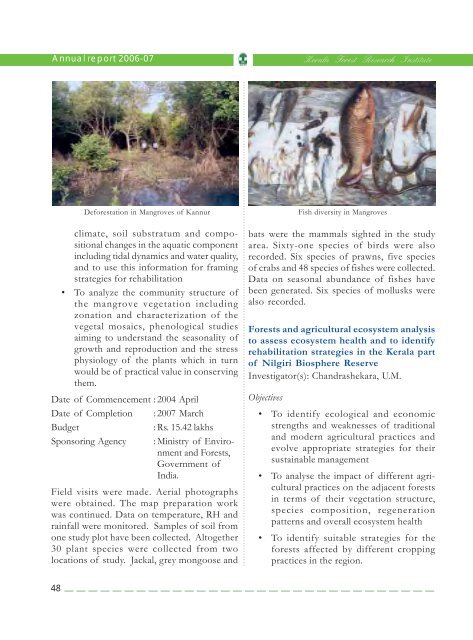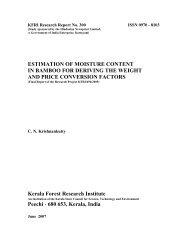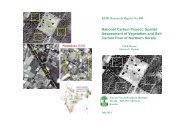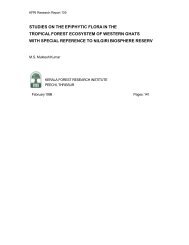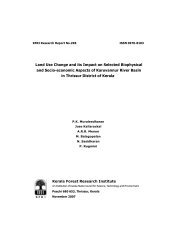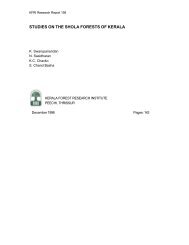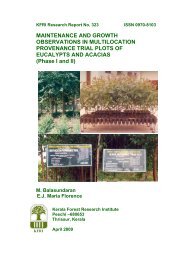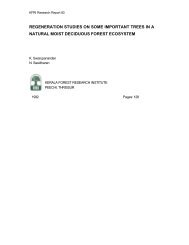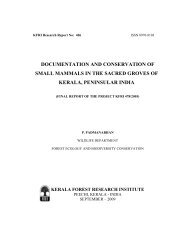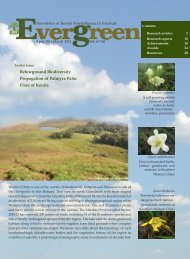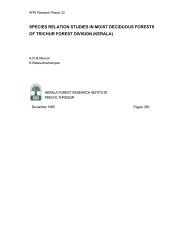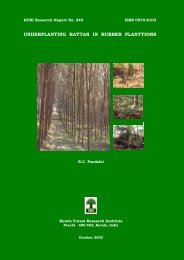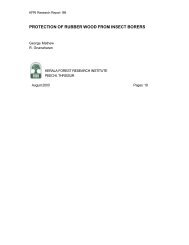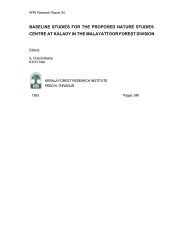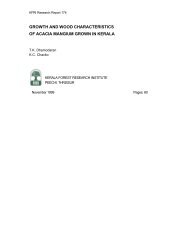Annual report <strong>2006</strong>-<strong>07</strong><strong>Kerala</strong> <strong>Forest</strong> <strong>Research</strong> <strong>Institute</strong>Deforestation in Mangroves of Kannurclimate, soil substratum and compositionalchanges in the aquatic componentincluding tidal dynamics and water quality,and to use this information for framingstrategies for rehabilitation• To analyze the community structure ofthe mangrove vegetation includingzonation and characterization of thevegetal mosaics, phenological studiesaiming to understand the seasonality ofgrowth and reproduction and the stressphysiology of the plants which in turnwould be of practical value in conservingthem.Date of Commencement : 2004 AprilDate of Completion : 20<strong>07</strong> MarchBudget: Rs. 15.42 lakhsSponsoring Agency : Ministry of Environmentand <strong>Forest</strong>s,Government ofIndia.....................................................................................................................................................................................Field visits were made. Aerial photographswere obtained. The map preparation workwas continued. Data on temperature, RH andrainfall were monitored. Samples of soil fromone study plot have been collected. Altogether30 plant species were collected from twolocations of study. Jackal, grey mongoose andFish diversity in Mangrovesbats were the mammals sighted in the studyarea. Sixty-one species of birds were alsorecorded. Six species of prawns, five speciesof crabs and 48 species of fishes were collected.Data on seasonal abundance of fishes havebeen generated. Six species of mollusks werealso recorded.<strong>Forest</strong>s and agricultural ecosystem analysisto assess ecosystem health and to identifyrehabilitation strategies in the <strong>Kerala</strong> partof Nilgiri Biosphere ReserveInvestigator(s): Chandrashekara, U.M.Objectives• To identify ecological and economicstrengths and weaknesses of traditionaland modern agricultural practices andevolve appropriate strategies for theirsustainable management• To analyse the impact of different agriculturalpractices on the adjacent forestsin terms of their vegetation structure,species composition, regenerationpatterns and overall ecosystem health• To identify suitable strategies for theforests affected by different croppingpractices in the region.48
<strong>Kerala</strong> <strong>Forest</strong> <strong>Research</strong> <strong>Institute</strong>Annual report <strong>2006</strong>-<strong>07</strong>Date of Commencement : 2004 AprilDate of Completion : 20<strong>07</strong> MarchBudget: Rs. 12.00 lakhsSponsoring Agency : Ministry of Environmentand <strong>Forest</strong>s,Government ofIndia....................................................................................................................................................................................In each forest patch, transects were laid fromthe forest boundary to the interior of the forest.In each transect, quadrats of 20m x 20m wereestablished at 200m interval. Vegetation analysisin the quadrats was carried out separately forherbs, shrubs, tree seedlings and mature trees.The data obtained was further analyzed in orderto determine the extent of disturbance to theforest and also the successional status of forestpatch. Schematic diagram of each patchdepicting the level of disturbance at differentdistance from the forest boundary wasprepared. PRA exercises were conducted in thevillages around each forest patch in order tocollect information on 1. Causes for forestdisturbance, 2. Impact of changes in croppingpattern on the forest patch, 3. Historical changesin forest resource utilization, and 4.Preparation of landuse and land cover changemap based on senior citizen interview method.Quantification of different resources (leaflitter, understorey biomass, pruned materials,small poles and fuelwood) from the forest wasinitiated. Tree seedling density prior to and afterthe collection of leaf litter and understoreybiomass was quantified in order to estimate theloss of tree seedlings from the forest due tocollection of leaf litter and understorey biomassfor mulch in agricultural lands. Meetings offorest officials (Biosphere managers) andvillagers were conducted in order to presentthe data so far obtained and also evolve strategiesfor sustainable management of forestpatches.Field performance of mirco and macropropagated planting stock of selected fivecommercially important bamboo speciesInvestigator(s): Seethalakshmi, K.K.,Muralidharan, E.M., Unni, K.K.Objectives• To evaluate field performance of microand macro propagated planting stock offive commercially important species ofbam-boo, viz., Bambusa bambos, Dendrocalamusstrictus, D. asper, Pseudoxytenantherastocksii and Ochlandra travancorica inmultilocational demonstration plots to beestablished in <strong>Kerala</strong>, Tamil Nadu,Karnataka and Andhra PradeshDate of Commencement : 2004 JulyDate of Completion : 20<strong>07</strong> JuneBudget: Rs. 43.79 lakhsSponsoring Agency : Department ofBiotechnology,Government ofIndia.For testing the performance of species, plantingstock was prepared from rooted cuttings. TCplants were outsourced from different privateand public sector tissue culture units. Fortyhectares of plantation was established incollaboration with two beneficiaries atMoolagangal, Attappady. The plantation wasestablished with two species Bambusa balcooa andDendrocalamus asper. The survival has been morethan 70 per cent. Observations on growth arebeing recorded. A field nursery has been establishedin the plantation site. The demonstrationplot will serve to show the performance ofTC and VP plants. Intensive cultivation ofbamboo is taken up here by two progressiveplanters providing solar fencing for protectionand drip irrigation for better survival andgrowth of plants.49


